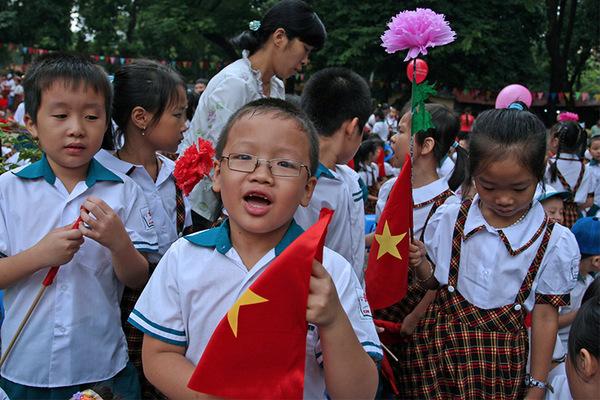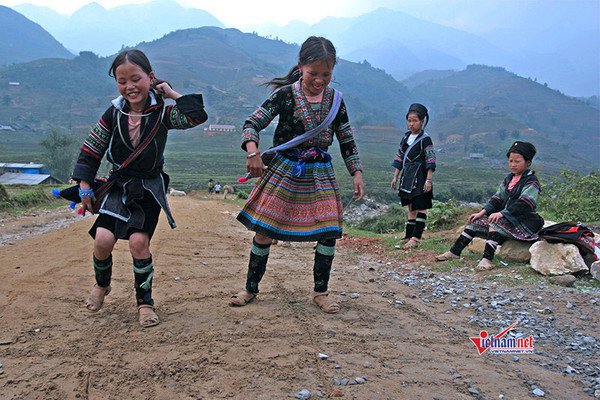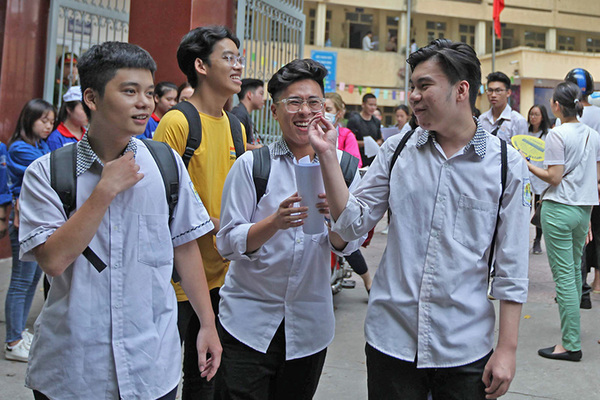 |
|
The policy on human rights education has been widely implemented in Vietnam. Photo: LAD
|
The policy on human rights education has been widely implemented
The political report at the XII Congress of the Party affirmed: Socialization of education was promoted; The policy has been directed by the concerned committees and authorities to implement and receive the support of the entire society.
And Directive No. 44-CT / TW of July 20, 2010, on human rights work in the new situation, requires: “The study incorporates the content of human rights into the educational program in the national education system. Developing content to propagate and foster knowledge of human rights suitable to every object in society. "
The national education system in Vietnam consists of 2 areas: 1 / Education in schools with the following levels: high school, university and career; 2 / Off-campus education, in which education at political and social organizations plays an important role.
If human rights education at schools involves systematic and formal teaching and training activities, off-campus human rights education, which is essentially in the political and social organizations, includes activities of propaganda, information dissemination, thematic activities and training aimed at fostering knowledge are essential.
The policy of educating the human rights of the Party and the State of Vietnam has been implemented more and more deeply in the system of schools and at political and social organizations as well as propaganda and education on the media. mass information.
Six directions for implementation
 |
|
In human rights education, besides the education and training system, solutions for strengthening out-of-school education are needed, which are basically in political and social organizations. Photo LAD
|
Assoc. Nguyen Thanh Tuan, in an article in the Communist Review, discussed the application of the opinion of the 12th Party Congress to human rights education in political and social organizations in Vietnam today. can be done in the following directions:
Firstly, sticking to the object and scope of the research, apply it to practice and put practice into teaching to connect teachers and learners.
The integration of a human rights-based approach in education at political and social organizations must not be far removed from the purpose and contents of thematic education; on the contrary, by their knowledge and experience, lecturers come from real people, real jobs with their qualities, actions and behaviors presented as typical examples in practice or thesis. specifically with the participation of learners, to provide both information and interpretation in order to prove the thesis into scientific points that are acceptable to both teachers and learners. Thereby helping students to actively, proactively grasp the content of the lesson quickly and can flexibly apply in real-life situations.
Secondly, designing lessons suitable for learners.
Lecturers study carefully, proactively compose lectures in a scientific and reasonable manner, following the principle of adhering to the program content and suitable subjects, in order to ensure that learning (and) practice in the classroom is both directed. guide students to self-study and study at home effectively. Thereby promoting the positive, proactive creativity in the process of learning, grasping and deepening information, specialized knowledge of each political and social field of students.
The approach based on human rights and the knowledge of human rights integrated in the political and social disciplines, approaches and knowledge will make the political and social fields imbued with the characteristics “ for the people, "thus more vivid, and more effective for practical guidance.
 |
|
To realize a human rights-based approach to education in political and social organizations, it is required creative use of knowledge of political and social sciences. Photo LAD
|
Thirdly, research and reasonable reference to some basic documents on human rights.
Currently, the number of documents that are "basic" about human rights is also abundant. Therefore, it is necessary to focus on selecting documents in the form of textbooks on the theory and human rights law of the Human Rights Research Institute of Ho Chi Minh National Political Academy, of the Faculty of Law of Hanoi National University and of the Academy of Social Sciences of the Vietnam Academy of Social Sciences, to be able to master basic human rights knowledge. As a result, teachers can understand the true nature, the most reliable views, principles and rationale in the research process of integrating a human rights-based approach into compilation and practice. show lectures in class.
Particularly for the law, it is still necessary to find out more legal documents related to the subject of the lecture. And in the process of preparing or delivering classroom lectures, it not only integrates a human rights-based approach, but also needs to apply the knowledge of human rights.
Fourth, improve teaching methods in the direction of combining a variety of methods to actively improve learners' cognitive activities.
To realize a human rights-based approach to education in political and social organizations, requires creative use of knowledge of political and social sciences. Which these subjects are often theoretical, abstract and highly general.
In addition to clarifying scientific knowledge with many terms, concepts, categories, and rules, it also has to convey to learners many important contents in the lines, guidelines, policies and laws of Party and government. The human rights-based approach, as well as that of other approaches, may be integrated into the teaching of political and social subjects (or subjects), because they are consistent. radical methodological principles of dialectical materialism: a / Objective principle; b / Historical - specific principles; c / System principles and development
In fact, with theoretical teaching experience combined with practical summation, lecturers can combine many different teaching methods depending on the subject matter (or lecture) into the condition. classroom as well as audience.
For students, in order to learn (and) practice, they need to participate in extracurricular activities, career-oriented conferences and field trips. The combination of different teaching methods will help learners access the content of the lesson at different angles and conditions. From this they contemplate that, only from their qualities and needs can they be able to understand more deeply and apply better their political and social knowledge.
Fifthly, pay attention to the relationship with domestic and international practices, with the lines, guidelines, policies and laws of the Party and the State.
For each practical problem, when teaching, students need to be aware, explain the problem objectively and comprehensively, evaluate problems from multi-dimensional perspectives, and combine practical with theories in national and international. As a result, they help them become more aware of political and social issues often associated with human rights; and the human rights issue, while a fundamental and permanent issue in every individual and community, the process of addressing that and ensuring human rights, must always be linked to other issues in Vietnam's practical political and social life in the current international context.
In the end, all political and social topics, after all, come and go for people. However, due to the multidimensional and complicated nature of understanding and approaching political and social issues, the integration of human rights approaches and knowledge in teaching these subjects (or subjects) , up to now, has not been paid enough attention and there are many shortcomings and limitations.
Therefore, there is a need to learn and talk about the experience of integrating a human rights-based approach and the integration of human rights knowledge in the education of political and social topics, to obtain a number of common perceptions, aimed at promoting the fostering of knowledge, approach and research on human rights for political and social organizations throughout the country.
Compiled by Thu Thuy
 In human rights education, besides the education and training system, solutions for strengthening out-of-school education are needed, which are basically in political and social organizations.
In human rights education, besides the education and training system, solutions for strengthening out-of-school education are needed, which are basically in political and social organizations.